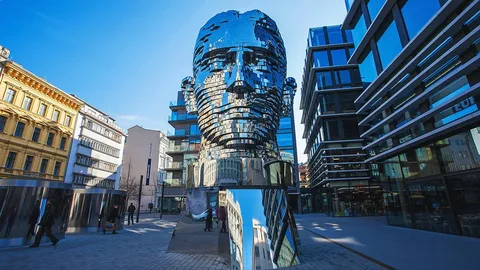Some cities dazzle with grandeur and light — and then there is Prague. Here, the magic lies in the mist, in the cobbled alleyways that seem to twist into other dimensions, and in the haunting silence that falls over the Vltava River at dusk. It’s a place where stories linger in the air, where ghosts of the past walk beside you, and where Franz Kafka, Prague’s most enigmatic son, still seems to whisper from the shadows. Walking through Prague isn’t merely about admiring Gothic cathedrals or Renaissance facades — it’s about stepping into a surreal narrative that exists somewhere between dream and reality.
Prague wears its contradictions like a perfectly tailored coat — sombre yet whimsical, ancient yet defiantly modern. Gothic spires reach skyward while playful baroque buildings line the narrow streets below. It is this tension — this fine line between order and absurdity — that made it the ideal stage for Kafka’s peculiar universe. For those seeking a richer kind of journey, cheap holidays to Prague offer something extraordinary: not just visual beauty, but emotional and intellectual depth, a walk through the landscape of literature and philosophy. Unlike typical sightseeing trips or rushed itineraries found in many all-inclusive holidays, Prague invites stillness and introspection. It urges you to slow down, to look twice, and to read between the lines — both literally and figuratively.
Every courtyard may hide an old statue; every café, a long-forgotten poem. Even a tram ride becomes poetic. Whether you’re embarking on your first Prague holiday or returning to uncover new stories, you can choose companies like Travelodeal makes it easier to discover the quieter corners of the city — places where imagination meets memory, and fiction bleeds into fact.
The Kafka Museum: A Portal into the Surreal
Your journey begins at the Kafka Museum in the serene Malá Strana district. This isn’t your standard biography-in-glass-cases museum. Instead, it’s immersive, atmospheric, and borderline disorienting — much like Kafka’s own stories. The dim corridors echo with distorted sound bites and flickering visuals. Exhibits include first editions, handwritten letters, and photographs that give insight into Kafka’s life, mind, and internal struggles.
One of the most curious elements is found in the museum’s courtyard: the famous statue by controversial Czech artist David Černý. Two bronze figures urinate into a pool shaped like the Czech Republic; their movements are controlled by a text message system. It’s absurd, political, and darkly humorous — all things Kafka would have appreciated. It sets the tone perfectly for the rest of your literary pilgrimage.
In His Footsteps: From Castle to Courtyard
Leaving the museum, follow the cobbled path of Nerudova Street toward Prague Castle. Though grand today, this route holds memories of Kafka’s daily commutes and philosophical wanderings. On Golden Lane, at house No. 22, you’ll find the humble room where Kafka wrote some of his best work. The space is tiny — barely enough for a desk and chair — yet it once held entire worlds.
As you move into the Old Town, stop at the statue of Kafka by Jaroslav Róna. Suspended atop the shoulders of a towering, headless figure in a suit, Kafka appears both empowered and overwhelmed. The sculpture captures the duality of his life: revered by some, alienated from most. It is striking, strange, and hauntingly appropriate — a perfect embodiment of the man and the myth.
Literary Legacy in Everyday Prague
But Kafka’s Prague is not only found in memorials and museums. It lives in the textures of daily life. It’s in the creaky wooden shelves of secondhand bookstores, the hushed libraries tucked behind ornate doors, and the student cafés where philosophy flows more freely than coffee. It’s in the quiet gaze of a tram passenger, staring out the window as if pondering the absurdity of the universe.
To walk Prague in Kafka’s footsteps is to see the city’s dual identity: beautiful and brutal, poetic and bureaucratic, eternal yet evolving. You don’t just see the landmarks — you feel the metaphors. Kafka might have felt trapped in the city, but it shaped him in return. And strangely, his words set the modern traveller free — free to interpret, to imagine, and to wander beyond the guidebook.


